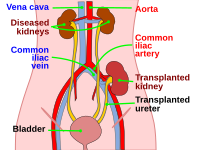
Photo from wikipedia
Kidney transplantation is the therapy of choice for people living with kidney failure who are suitable for surgery. However, the disparity between supply versus demand for organs means many either… Click to show full abstract
Kidney transplantation is the therapy of choice for people living with kidney failure who are suitable for surgery. However, the disparity between supply versus demand for organs means many either die or are removed from the waiting-list before receiving a kidney allograft. Reducing unnecessary discard of deceased donor kidneys is important to maximize utilization of a scarce and valuable resource but requires nuanced decision-making. Accepting kidneys from deceased donors with heterogenous characteristics for waitlisted kidney transplant candidates, often in the context of time-pressured decision-making, requires an understanding of the association between donor characteristics and kidney transplant outcomes. Deceased donor clinical factors can impact patient and/or kidney allograft survival but risk-versus-benefit deliberation must be balanced against the morbidity and mortality associated with remaining on the waiting-list. In this article, the association between deceased kidney donor characteristics and post kidney transplant outcomes for the recipient are reviewed. While translating this evidence to individual kidney transplant candidates is a challenge, emerging strategies to improve this process will be discussed. Fundamentally, tools and guidelines to inform decision-making when considering deceased donor kidney offers will be valuable to both professionals and patients.
Journal Title: Transplant International
Year Published: 2022
Link to full text (if available)
Share on Social Media: Sign Up to like & get
recommendations!